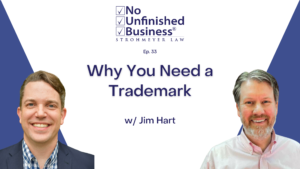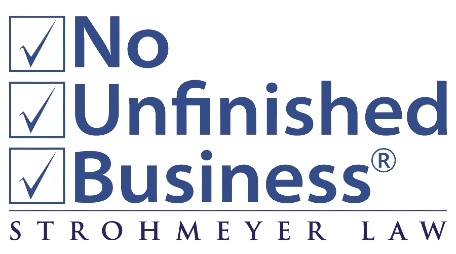What to Do When Someone is About to Die
What to Do When Someone is About to Die
It’s a terrible situation – someone you love and care about is about to die. And that heartbreak of losing a loved one can be made worse if there’s chaos on the horizon regarding the estate matters. Here’s what to do.
What to Do When Someone Is About to Die
It’s a terrible situation – someone you love and care about is about to die. And that heartbreak of losing a loved one can be made worse if there’s chaos on the horizon regarding the estate matters. Luckily, there are some steps you can take to ensure that the estate matters are kept as painless as possible, even if there’s an estate plan and will in place. Board Certified Tax and Estate attorney John Strohmeyer walks us through the details of these steps.
You’ll want to:
1) Know where the governing documents are
2) Have the original documents/will
3) Know and understand what is supposed to happen according to those documents, and whether changes are needed immediately
4) If changes are needed, determine if the testator able to make them
5) Consider all non-probate assets
6) Have a complete list of ALL the assets
7) Understand the valuation of all assets and potential issues
8) Anticipate any potential conflicts with family members or creditors
9) Know whether the estate is going to be solvent (assets greater than debt)
VIDEO TRANSCRIPT:
Oh, no, we’ve just gotten word that one of our family members is about to pass. What we should be thinking about in the final days and weeks of a family member’s life is how to make sure that estate planning and probate is going to be carried out.
Today we’re going to be talking about what we can be doing when we know a death is imminent.
I’ve got nine things for you to be thinking about and we’ll go through each of those. First and foremost, we want to know who is going to be in charge and who is going to be receiving the assets. The primary place to look is a last will or a trust agreement. We want to know who is going to have control or who’s going to be named as the executor or trustee or the administrator. We also want to know who is going to be entitled to that property.
So, we start by finding out where the governing documents are. Once we know what that governing document should be, we want to make sure that we’ve got the original document.
Here in Texas, one of the things that we always look at in terms of probate is if we are filing the original document. If we don’t have the original will, we have a bigger problem. Why? Texas law presumes that if we don’t have the original, the original was destroyed by the testator. Why? Who knows why. But the assumption is, if we can’t find it, then the person who died didn’t like the will and they threw it away, and that’s why we can’t find it. Now, there are ways to get around this. We can still prove that this was the original, or even if it wasn’t the original, it’s the will that everybody agrees should be treated as the original. But we’re always going to be better off having the original document.
Now that we know where the original and governing documents are, we need to know what’s going to happen under these documents. We want to walk through things and see who’s gonna get what and if this is the right plan. So, the question we’re really getting to is: do we need to make any changes to the documents that are in place?
This is going to vary. There’s no right or wrong answer. But it’s important to take a look at the document and see what it says. Many times documents were put in place years, if not decades, earlier, and the gifts and people appointed may not be the right choice anymore. I had a client recently where they a drafted will over a decade ago and the rough plan was still in place. They were going to leave everything to their spouse, otherwise to the kids, if both parents had died. That part hadn’t changed. But what had changed was the addition of a few assets that weren’t going to fare well under the planned documents. Why? Well, it was going to leave stock in a closely held corporation to a trust that wasn’t going to be allowed to own it.
So, rather than impose that problem and complication on the family, we made sure to update the documents to ensure a smoother transition of that property. When it comes to this, we want to make sure that we’re not having our documents create any problems. If we can clear up any of those problems before we need to face them, so much the better.
Item four: if we want to make changes will our testator, the person who’s about to pass, have the capacity to make any changes to their documents? This obviously is going to be more of an up or down question, but we want to know what capacity they are in and if it is even something we can be looking at.
While we’ve been thinking about probate and transfers under last will, we also need to consider the non-probate assets.
Wills don’t control everything, but they do control probate property. Probate property is going to be anything that doesn’t already have any sort of legal label or a contractual obligation on who receives an asset when somebody dies. So, non-probate property — things like life insurance, annuities, 401ks, IRAs, 403Bs, and bank accounts that have transfer on death provisions — are not going to be governed by the terms of the will. We want to make sure that we know which assets are not going to be following the will, and we also want to make sure that they’re going to the right place. Again, while somebody’s still alive, we still may have the chance to make changes, and that’s what we want to do. We want to know now where things are going and if that’s going to cause any problems.
After that, we’ve looked at just the non-probate assets. Let’s make sure we’ve got a good list of ALL of the assets. What is out there? What is the full range of assets that we should be looking at? While we have the person still alive we can make sure that they’ve taken a look at the list and confirmed that this is everything. The problem is that once somebody dies, we don’t have some clearing house to go look at to find all of their assets. If we didn’t know they had an account at Wells Fargo, Cadence, Chase, Amegy or Regions, we’re not going to know without going to that bank, picking up the phone, reaching out, and seeing if they can tell us what accounts might’ve been there. So, again, getting that full list of assets now, so we know what we’re dealing with, will really help us.
After that, looking at those assets, we want to know if there are any valuation issues, meaning if we’re going to have to figure out what something is worth. Sometimes we’re just going to be giving all of one asset to one person. Sometimes it’ll be equal shares, but if we’re giving out certain values of assets, such as only $1000 goes to this person or $10,000 goes to that person, we’re going to have problems figuring out what that asset is worth. You should be looking to line that up as soon as possible because the most difficult response is needing to get an appraisal of the asset. If we need to get an appraisal, it’s going to take time and it’s going to take money, so we want to start lining that up as soon as possible.
Looking at the home stretch, this is going to be figuring out what some final problems are that we can maybe anticipate and start to neutralize now. First, are there any expected conflicts with family members? If we know that somebody is not going to like the will or what’s going to happen under these documents, we want to identify that as soon as possible so that we can possibly put something in place to limit the effectiveness. We may want to have somebody sign a new will, if they can, just to confirm the terms of the old will. That might stop a person from trying to challenge it if they know that the gifts under the will from years ago are still the gifts that are intended to be made. Again, we should try to identify those conflicts as soon as possible, so that we can head them off.
Finally, the last thing to think about with somebody who doesn’t have long to live is whether their estate going to be solvent. Do they have more assets than debts? Again, this is looking down the line: what’s going to happen, who’s going to be entitled to property, and what does that mean for the family that’s expecting to receive assets?
So, we’ve talked about a number of things today. Ultimately, when you get word that somebody is going to be passing soon, you do want to make sure that you have taken care of as much as possible while they’re still alive. Why? They have a lot of knowledge in their head that we want to get out of them as soon as possible, because that’s going to help the family transition.
There are a lot of things that we can do for this person to speed the transition and make it easy for their family members. But really once we know that somebody is going to pass, we want to make sure that we’re taking care of things as soon as possible and as easily as possible. So, we’re going to want to find the original last will. We’re going to want to find that trust agreement. We’re going to see if we need to make any changes and if we do want to make changes, if the person who’s getting ready to pass is actually able to make those changes. Next, we’re going to want to find all of their assets, or all of the property they have, both real property. Things like dirt, houses, and financial accounts, such as bank accounts, IRAs, and 401ks. Where are they going? What does the will say about it? Do they have beneficiary designations that will override that will? Finally, are there going to be any valuation issues or potential conflicts either with family members or with any of the creditors of the estate?
End-of-Year Strategies for Irrevocable Gifting Trusts
As the year draws to a close, there are some crucial actions to take with an irrevocable gifting trust.
What to Do If You Receive an IRS Letter
Receiving a letter from the IRS might send shivers down your spine. So what's your first step? Is it always a cause for alarm? Let's walk through what you should do.
Why You Need a Trademark
We'll explain the the four main areas of intellectual property for business owners, why trademarks are crucial, and how to get your marks registered.





